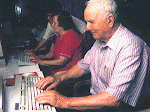Nashville, TN - Experts agree that the bond between a newborn baby and their former host is one of the most important psychosocial milestones in childhood, and an increasing number of hospitals are using an objective assessment tool to provide real-time feedback so that the healthcare team, in consultation with the mother, can make informed parenting choices.
 |
| A mother, shown here more than 3 inches from her newborn, has probably already doomed the baby to a lifetime of despair because of poor bonding in the pivotal first 18 to 26 years |
"Bonding is the intense attachment that develops between a mother and her baby," Mort Fishman, Chief of Neonatal Psychology at Willie Nelson's Birthing Pavilion within Vanderbilt Children's Hospital in Nashville, explained. "It's what inspires a mother to love their baby and to care for them despite all the exhaustion, the drain on financial resources, and the loss of personal freedom. And let's not forget what it does to their bodies, which is just a shame...a real shame."
Scientists don't know everything about bonding between a mother and a baby, which was first discovered by a team of top white men in the 1960s, but we have learned a lot. It is clear, for example, that a strong attachment helps to establish a relationship pattern that will last throughout the lifespan of a child. Studies of newborn monkeys who were given mannequin mothers at birth showed that human infants should be held face down against their mother's bare chest frequently until at least senior year of high school in order to ensure that they never experience any emotional dysregulation during the transition from the neonatal period into a 4-year undergraduate program.
"Bonding is key in the development of a sense of security and positive self-esteem," Fishman revealed. "A mother's responsiveness to an infant's behavioral cues has a huge impact on their social and cognitive development, and a non-bonded newborn is more likely to suffer from despondency and despair. Sad babies just break our hearts here at Willie's. I just spoke to a nurse over at Reba McEntire's Center for Women and Hot Chicken Hut and she said they feel the same way over there."
One of the most challenging aspects of assisting the bonding process has been a lack of insight into the perspective of the baby and a means of determining an exact percentage of bonding on a real-time basis. The development of an assessment tool that uses objective data from a bedside evaluation of a newborn was something that neonatal psychologists like Fishman waited decades for. "This is a game changer in my opinion. This scoring system is something that we now use in our pavilion to give women feedback on how good of a mother they are being, but it's also something that fathers can easily learn to use at home. Most women do great, but some just need a little nudge in the right direction to get above the recommended benchmark of 80% bonded."
Bonding is a complex and personal experience that often benefits from the outside opinions of friends, family, and random people in Facebook comment sections. Fishman adds that there is no magic formula when it comes to ensuring a successful bond between a mother and her baby. "No, it certainly isn't something that we just came up with a few decades ago in order to blame mothers for stuff like juvenile delinquency or autism. It's a science. And it's important."

No comments:
Post a Comment